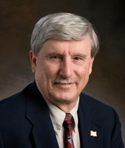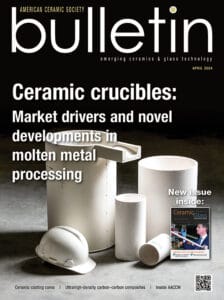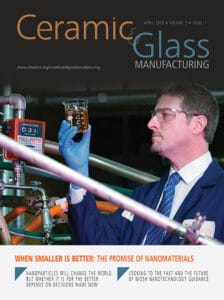 After working 40 years at the Savannah River National Laboratory in Aiken SC, George Wicks retired in 2013 at the position of Consulting Scientist, the highest technical level in the organization at that time. He currently serves as an independent consultant with his own company, is adjunct professor at several universities, and works as CTO at the Applied Research Center and VP/CTO of SpheroFill, a new biotech company.
After working 40 years at the Savannah River National Laboratory in Aiken SC, George Wicks retired in 2013 at the position of Consulting Scientist, the highest technical level in the organization at that time. He currently serves as an independent consultant with his own company, is adjunct professor at several universities, and works as CTO at the Applied Research Center and VP/CTO of SpheroFill, a new biotech company.
Since receiving his advanced degrees from Harvard University and MIT, Wicks has worked extensively in many areas of ceramics and glass science, as well as in other fields and disciplines during his career. This includes research activities in nuclear waste management, remote glass melters, environmental remediation, sensor development, corrosion of materials, hydrogen storage systems, alternative and renewable energy, nuclear disarmament activities, C&B agents, hybrid microwave technology, and a variety of new medical initiatives. Among his many contributions are development of the first ‘slurry feeding system’ for vitrification of the 34 million gallons of high-level radioactive waste at the Savannah River Site (SRS) in the more than billion-dollar Defense Waste Processing Facility (DWPF), currently in production. He has also been very active in leaching studies of nuclear glasses and in assessing chemical durability of waste glass products and systems. He is coauthor of the SRL Kinetic Leachability Model [Wallace-Wicks Model] describing leaching behavior of the complex 40-component SRS waste glass system. Also, he designed, developed and coordinated, the first major international seven-country, in situ testing program in the U.S., involving burial of simulated nuclear waste systems. Wicks is co-inventor of sol-gel indicators, a new class of composite materials that can be fabricated into sensors, and integrated into important fiber optic, analytical monitoring devices for environmental measurements and other uses, including medical applications. He is co-inventor of sol-gel metal hydrides and porous-walled hollow glass microspheres˗ composites, which have the ability to store unusually large amounts of hydrogen (both reversibly and very effectively for the glass microspheres)˗ also providing a unique drug delivery tool. The team and its glass microsphere technology received an R&D 100 Award in 2011 and in 2012, was voted “Top Honors” at the NNSA Symposium on “Discovery and Innovation.” He is co-inventor of hybrid microwave technology with the ability to remediate hazardous components and reclaim reusable metals, and also conduct decontamination of law enforcement equipment and materials, while retaining forensic signatures. In 2013, Wicks was elected to the World Academy of Ceramics, was honored in The American Ceramic Society, with the Distinguished Life Member Award in 2014, and in 2016 became a Fellow in ASM International.
Wicks has published a considerable amount of work in these various areas, which includes more than 200 publications and almost two dozen patents, to date. He also authored or co-authored seven books and nine invited chapters in texts and encyclopedias and served as cochairman for more than dozen international conferences. He served as 2011-2012 president of The American Ceramic Society, served on the ACerS Board of Directors, past president of the National Institute of Ceramic Engineers, served as a member of the U.S. Materials Review Board and served as adjunct professor over the years to Clemson University, University of Florida, Virginia Tech, Medical College of Georgia and Georgia Regents University, as well as serving on advisory boards to a number of universities. He served as a member of the DuPont Corporate Ceramics Board and testified on technical aspects of nuclear waste management and weapons dismantlement activities for various committees, including those of the National Academy of Sciences.
Among his awards and honors include the South Carolina Governor’s Award for Excellence in Scientific Research, South Carolina Academy of Science, Alpha Sigma Mu International Honorary Society’s Distinguished Life Membership, CNTA Distinguished Scientist of the Year, SRS Career Achievement Award, the Joan Hodges Queaneau Palladium Medal, George Westinghouse Gold Corporate Award, two Westinghouse Signature Awards, as well as the Westinghouse Innovators Award and SC Small Enterprise of the Year. ACerS honors include the Greaves Walker Award, Arthur L. Friedberg Memorial Lecture, D.T. Rankin Award, James Mueller Memorial Lecturer and ACerS Distinguished Life Member honor.




